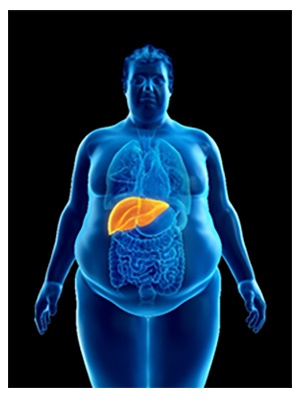 The connection between Obesity and Fatty liver
The connection between Obesity and Fatty liver
Until today, the exact cause of fatty liver has not been established. But, there are similarities in patient profiles that help determine some possible causes. One such cause is obesity. Fatty liver is basically the accumulation of fat in the liver, and up to a certain percentage it is normal to have fat in the liver. But, when the amount exceeds is when the real problem begins. Most people don’t even realise the fact that they suffer from fatty liver until they are tested for another reason. Which is why, maintaining a healthy lifestyle and staying fit is crucial.
How is obesity related to fatty liver?
Obesity is a problem prevalent worldwide. Many people suffer from being overweight and only those determined to work towards losing the extra pounds, lead a healthy lifestyle. But for a few, hormonal changes can also play a big role in weight gain. Getting the right obesity treatment is therefore extremely important.
Obesity could also lead to major health problems like:
- Type II Diabetes
- Insulin Resistance
- Coronary Heart Disease
- Cerebrovascular Disease
- High Blood Pressure
- Gout
- Gallstones
- Colon Cancer
- Sleep Apnea
- Nonalcoholic Fatty Liver Disease (NAFLD)
Obesity is becoming a serious health concern. There is much awareness being raised already and now people are becoming more conscious about the health implications that it brings along. Having a liver that is damaged due to obesity can only be reversed in situations when proper care is taken. Also, if not taken care of initially, it could lead to irreversible liver damage or even liver cancer.
NAFLD (Nonalcoholic fatty liver disease)
 Non-alcoholic fatty liver disease is one of the most common causes of chronic liver, far surpassing alcohol-related liver disease. Many people do have the disease and are ignorant about it. It is when symptoms, which are common to other issues too, act up, it causes problems. The short-term effects are manageable but the long term effects can cause adverse effects. Some of the potential problems that may arise are:
Non-alcoholic fatty liver disease is one of the most common causes of chronic liver, far surpassing alcohol-related liver disease. Many people do have the disease and are ignorant about it. It is when symptoms, which are common to other issues too, act up, it causes problems. The short-term effects are manageable but the long term effects can cause adverse effects. Some of the potential problems that may arise are:
- Gastrointestinal Bleeding
- Anemia,
- Abnormal Brain Function
- Cirrhosis
- Liver Cancer
- Liver Failure
As awful as it sounds, it is even worse for people who are living with the advanced stages of this disease. For most people who are in the initial stages of this disease can reverse the problem by making simple lifestyle changes. And when we say simple, it is not really simple, it only sounds easy to folloe. But the fact remains that in order to lead a healthy life, free from NAFDL, one needs to follow a healthy diet and exercise regularly. Also, getting the right obesity treatment can go a long way in taking care of fatty liver.
So, what exactly are the obesity causes?
Obesity is caused when a person eats too much and moves and exercises too little. After we consume food, a bit a movement is recommended for digestion. But many simply don’t move around.
Here are some of the reasons that will give you a broader perspective on why this happens:
- Inherited factors
- Environmental reasons
- Personal diet
- Exercise choices
- Pregnancy
- Stress
- Lack of sleep
- Quitting smoking and more
It is never easy to lose the extra weight gained. For some though, it can be. What is good is that obesity can be managed and controlled. All it needs is some determination and people can become fit after a period of time. Changes in diet, exercising regularly and ensuring that you follow this regime regularly can help achieve the goal of weight loss. After all, weight loss is not only about a cosmetic procedure but also a medical concern that must be addressed especially because of all the complications it brings along.
Obesity diagnosis
 How does the doctor determine whether you are obese or no? One sure way to find out yourself is by checking your BMI (Body Mass Index). If it is more than 30 then you would need to work around a plan to bring it in the recommended range. Other factors that are considered are:
How does the doctor determine whether you are obese or no? One sure way to find out yourself is by checking your BMI (Body Mass Index). If it is more than 30 then you would need to work around a plan to bring it in the recommended range. Other factors that are considered are:
- Your doctor determines your health history to get a clearer picture of why you have suddenly gained weight. He would also look into your family history to strengthen the obesity diagnosis.
- A general medical test will also be performed to see if you suffer from any ailments or no.
- Measuring your waist will also help in determining how much risk you are at from developing serious problems like diabetes, heart disease or NAFLD.
- Regular blood tests may also be performed to understand the cholesterol levels, liver function and thyroid. All these are important parts of obesity diagnosis.
- During the obesity diagnosis, the doctor will also check for other potential reasons like diabetes and heart problems that could contribute to your weight gain.
All these factors during the obesity diagnosis are crucial to understand the underlying reason for weight gain. It is only when the doctor knows the root cause, can a treatment plan be laid down.
Whatever the obesity causes are, it is important that you consciously work towards maintaining good health. Being obese does not only affects your internal organs but also takes a mental toll on you. There is automatically an effect on your self-esteem and confidence because of obesity and that could lead to depression too. Which is why, it is advised that you take care of your overall well-being. Physical and mental health is very important. Make sure that if your weight is causing trouble, you must get yourself the right treatment. It is one way to know that you are leading a good life and keeping all health related complications out of your life. Eat healthy, exercise regularly and make sure to lead a stress-free life. These factors are important to ensure that you stay healthy. Also, make it a point to schedule a doctor’s appointment once a year just to be sure that everything is working well for you. So, are you ready to make these lifestyle changes? You should be.



 So how does one know if they fall under the obese category or not? There are a few ways to determine if you are obese and if you are, appropriate treatment plans can be charted out. To know if you are obese, you could check the BMI chart. If your weight exceeds the normal limits, it is time to take action. Your waist circumference would also be able to tell you the same. If you measure more than 36 inches, it means you a victim of obesity. Fat deposit around the stomach area is one of the first places the weight gain begins. Your health history can also determine if you are obese. Additionally, blood tests and general physical examinations can also help one understand if they suffer from the problem or not. So, how can obesity be treated?
So how does one know if they fall under the obese category or not? There are a few ways to determine if you are obese and if you are, appropriate treatment plans can be charted out. To know if you are obese, you could check the BMI chart. If your weight exceeds the normal limits, it is time to take action. Your waist circumference would also be able to tell you the same. If you measure more than 36 inches, it means you a victim of obesity. Fat deposit around the stomach area is one of the first places the weight gain begins. Your health history can also determine if you are obese. Additionally, blood tests and general physical examinations can also help one understand if they suffer from the problem or not. So, how can obesity be treated? The connection between Obesity and Fatty liver
The connection between Obesity and Fatty liver Non-alcoholic fatty liver disease is one of the most common causes of chronic liver, far surpassing alcohol-related liver disease. Many people do have the disease and are ignorant about it. It is when symptoms, which are common to other issues too, act up, it causes problems. The short-term effects are manageable but the long term effects can cause adverse effects. Some of the potential problems that may arise are:
Non-alcoholic fatty liver disease is one of the most common causes of chronic liver, far surpassing alcohol-related liver disease. Many people do have the disease and are ignorant about it. It is when symptoms, which are common to other issues too, act up, it causes problems. The short-term effects are manageable but the long term effects can cause adverse effects. Some of the potential problems that may arise are: How does the doctor determine whether you are obese or no? One sure way to find out yourself is by checking your BMI (Body Mass Index). If it is more than 30 then you would need to work around a plan to bring it in the recommended range. Other factors that are considered are:
How does the doctor determine whether you are obese or no? One sure way to find out yourself is by checking your BMI (Body Mass Index). If it is more than 30 then you would need to work around a plan to bring it in the recommended range. Other factors that are considered are: